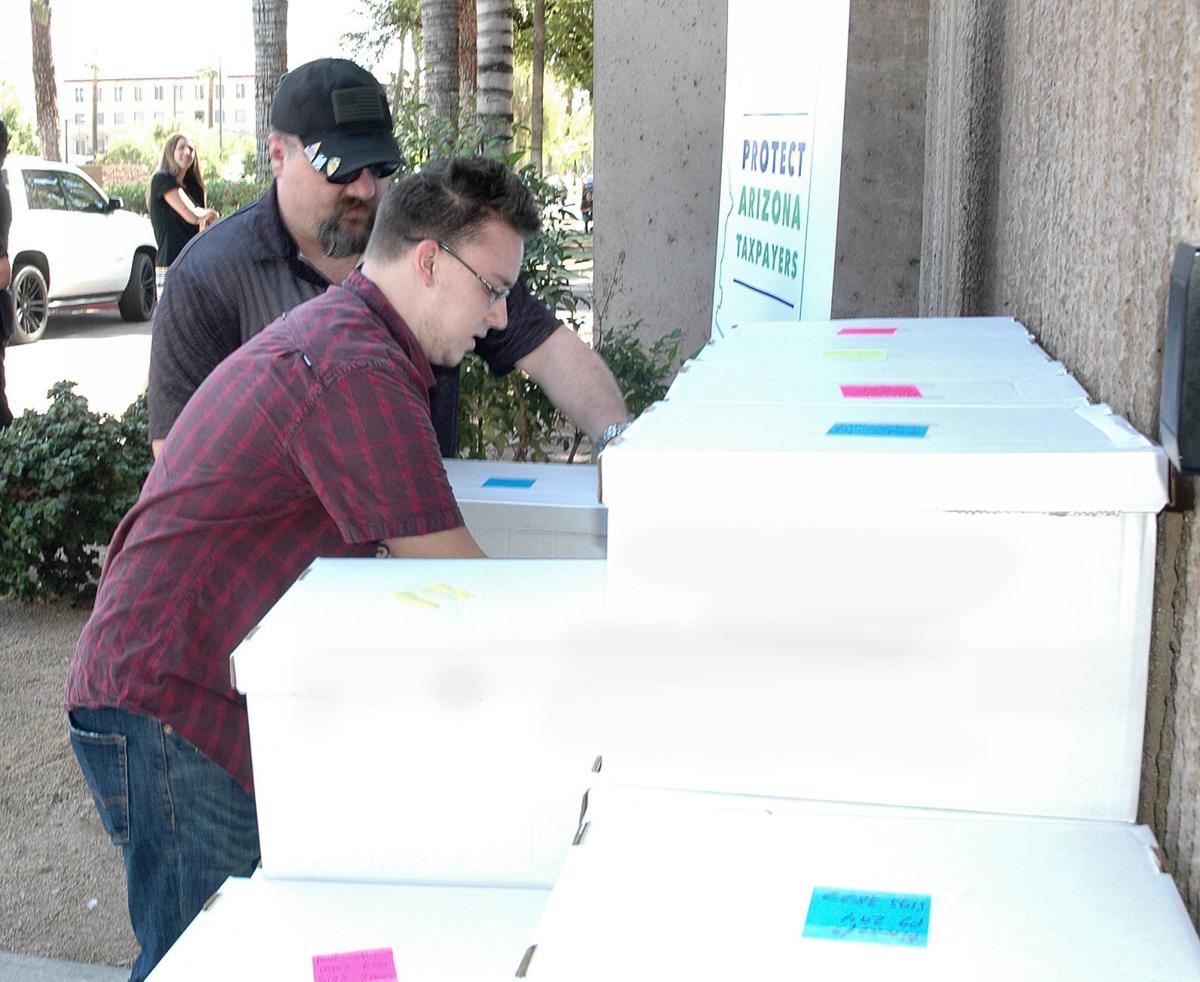PHOENIX — The record number of Arizonans who turned out to vote this year has a flip side for direct democracy: It’s going to make it harder for voters to propose their own laws or get rid of ones they don’t like.
That’s because state law bases the number of signatures required for referenda and initiatives on how many people voted in the most recent gubernatorial election.
Four years ago, when Republican Doug Ducey won against Democrat Fred DuVal and a host of minor party candidates, the votes in that race totaled 1,506,416.
With a 10 percent requirement for statutory changes, that meant it took 150,642 signatures in 2016 and this year to propose a new law via initiative; a constitutional amendment, with a 15 percent mandate, needed 225,963 signatures to get on the ballot.
This year, the group Save Our Schools needed just 75,321 valid signatures — 5 percent — in its successful drive to let voters ratify or reject a Legislature-approved measure to expand a state voucher program for private and parochial schools. The expansion was rejected on a 2-1 margin in the Nov. 6 election.
But Andrew Chavez, who owns Petition Partners, figures that the high turnout this year is going to sharply increase the required number of signatures for ballot measures in 2020 and 2022.
While a final count has not been released, he said the tally of votes cast in this year’s gubernatorial election — in which Ducey defeated Democrat David Garcia — likely will come out close to 2.15 million.
That means the next time lawmakers approve an expansion of vouchers — and proponents already are talking about it — Save Our Schools would need close to 108,000 valid signatures to give voters the final say. Given the normal error rate, they’d need to collect more than 130,000 signatures to ensure they have enough.
To propose a new state law via the ballot would require more than 215,000 valid signatures. And the entry fee, if you will, to get a constitutional proposal on the ballot would top 320,000 signatures.
So how hard will that be?
Chavez, who has helped groups collect signatures for nearly two decades, sees two sides to the question.
He said the high turnout this year means a larger number of Arizonans are connected to and participating in politics, “not only at the ballot box but on the streets.”
“Now you have an engaged electorate where people on the ground know what’s going on,” he said. “They look for ballot measures. They know about direct democracy.”
But Petition Partners and other firms in the business assess charges based on the number of signatures collected. So Chavez figures anyone who wants to propose a ballot measure for 2020 and will need paid circulators is going to need more cash.
That is not a big deal for the special interests that have money, he said.
This year those included the Realtors funding Proposition 126 to ban expanding sales taxes to services, and California billionaire Tom Steyer putting Proposition 127 and its renewable-energy mandate on the ballot.
Where it could make a difference is when groups don’t have deep pockets.
Consider education funding.
Lawmakers approved a pay raise for teachers and restoring some other funds cut during the recession. But they did not provide for any new source of dollars, instead counting on an expanding economy to generate the cash.
There was a proposal this year to provide a guaranteed source through an income-tax increase on Arizonans earning more than $250,000 a year. But that measure was kicked off the ballot after the Arizona Supreme Court concluded its required synopsis did not fully describe all implications.
David Lujan, director of the Arizona Center for Economic Progress, crafted the measure. He said he hopes a new batch of lawmakers, including some swept in by the #RedforEd movement, will address the issue, either directly or at least by referring a funding measure to the 2020 ballot.
“Certainly across Arizona people still see that we have an education funding crisis,” Lujan said. “And if the Legislature is not willing to do it, then we would certainly see the ballot as an option.”
Lujan said the new signature requirements won’t be a hurdle — if organizers get started earlier.
“We were able to get 277,000 signatures in two months,” Lujan said. “It’s certainly doable, the increased numbers, if we have more time to do it.”
Also looking at 2020 is former Attorney General Terry Goddard, whose proposed constitutional amendment to outlaw “dark money” influence on political campaigns this year came up short of the needed 225,963 signatures.
“To have a minimum requirement go from 225,000 to 320,000 or something in those versions, that’s a big stretch,” Goddard said.
Here, too, time is everything.
Goddard said circulators, half paid and half volunteers, gathered about 285,000 signers in five months. But he said a much earlier start won’t necessarily generate the nearly 400,000 that would realistically be needed in 2020 to survive a signature challenge.
“It’s hard to keep up enthusiasm over two years,” Goddard said. “So we’re wrestling with that right now.”
Another issue is that two years ago, the Republican-controlled Legislature threw hurdles in the path of groups that want to propose their own laws. Most significantly, lawmakers said initiative petitions must be in “strict compliance” with all election laws.
Until that time, Arizona courts found that petition drives by individuals proposing laws and constitutional amendments need be only in “substantial compliance” with the laws. That allowed votes on several measures to go forward despite what judges concluded were technical violations.
A legal challenge to the new strict compliance standard awaits a ruling by the Arizona Supreme Court.





